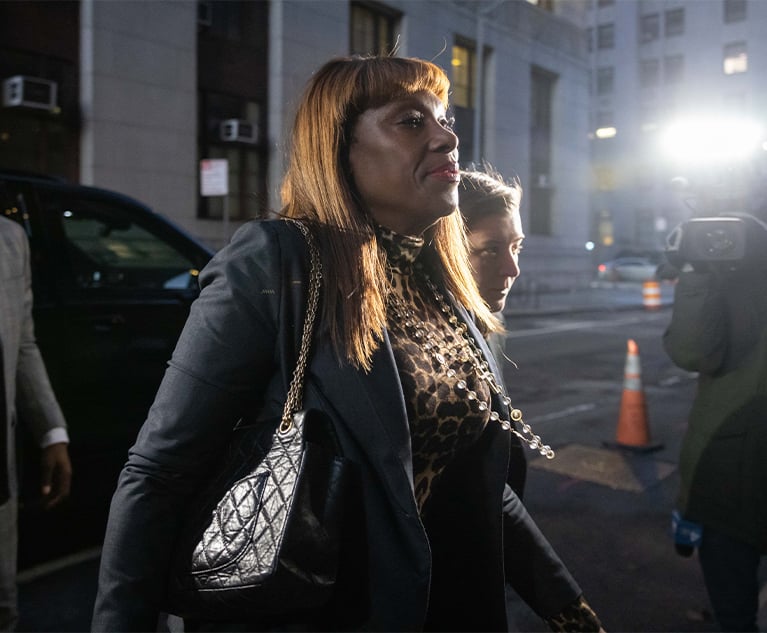Judge Denies Bid to Remove Infringement Suit Against 'Fifty Shades' Designer From NY
A copyright infringement suit concerning the use of an artist's work in an advertising campaign referencing the erotic drama “Fifty Shades of Grey” is bound by statute to remain in a Manhattan federal court, a judge ruled.
March 16, 2018 at 06:26 PM
3 minute read
 U.S. District Court for the Southern District of New York. Photo Credit: Photo: Rick Kopstein/ALM.
U.S. District Court for the Southern District of New York. Photo Credit: Photo: Rick Kopstein/ALM.
A copyright infringement suit concerning the use of an artist's work in an advertising campaign referencing the erotic drama “Fifty Shades of Grey” is bound by statute to remain in a Manhattan federal court, a judge ruled.
Kalliope Amorphous, a visual artist known for her self-portraits, alleges that Janet Morais and Amandio Pereira, a Virginia-based couple who market and sell furniture manufactured in Portugal, infringed upon two of her works for use in advertisements hawking pieces of furniture that can be seen in “Fifty Shades” and its first sequel, “Fifty Shades Darker.”
Morias was commissioned to design the furniture used in the first film.
Amorphous, who alleges violations of the Copyright Act of 1976, the Digital Millennium Copyright Act and the Lanham Act, says she never would have signed off on her works, titled “Go Back” and “Sunset,” being used to promote the films, which she described as “misogynistic and anti-feminist,” according to court papers.
The advertisements ran online and in periodicals, court papers state, as well as catalogues that were featured at trade shows.
Amorphous, who says she splits her time between New York City and her native Rhode Island, says she did not receive payment for her works and also claims that the use of her works in the ads caused her embarrassment and severe emotional distress.
The defendants moved to dismiss the case for lack of personal jurisdiction, arguing that the defendants have “nothing to do with New York.”
Denying the defendant's motion, U.S. District Judge Naomi Buchwald of the Southern District of New York said the defendants do a fair amount of business in New York, noting that, in 2016, they filled $200,000 worth of orders in New York, thus giving Amorphous personal jurisdiction under state law.
The judge said that long-arm jurisdiction was further established by the fact that the defendants took part in New York trade shows and sent sales representatives to the state.
Barbara Hoffman of the Law Office of Barbara Hoffman in Manhattan represents Amorphous.
Hoffman said in a voicemail left with the Law Journal that Buchwald's ruling “enables artists to exercise their right to display” their works on their own websites where they can receive compensation for their works.
“The defendants thought they could use my client's work with impunity, displaying the images around the world, and thought they could avoid liability for copyright infringement through a tangle of jurisdictional arguments,” Hoffman said.
The lawyer for the defendants, Neil Koslowe of the Washington, D.C.-based Potomac Law Group, said in an interview that his clients have yet to decide their next steps, including whether or not they will appeal Buchwald's ruling, and that thus far their position in the matter has been dictated by jurisdictional issue.
“The main issue is 'why is a Rhode Island plaintiff suing a Portugal company in New York?',” Koslowe said.
This content has been archived. It is available through our partners, LexisNexis® and Bloomberg Law.
To view this content, please continue to their sites.
Not a Lexis Subscriber?
Subscribe Now
Not a Bloomberg Law Subscriber?
Subscribe Now
NOT FOR REPRINT
© 2024 ALM Global, LLC, All Rights Reserved. Request academic re-use from www.copyright.com. All other uses, submit a request to [email protected]. For more information visit Asset & Logo Licensing.
You Might Like
View All
Attorneys 'On the Move': Structured Finance Attorney Joins Hunton Andrews Kurth; Foley Adds IP Partner
4 minute read

NY Civil Liberties Legal Director Stepping Down After Lengthy Tenure

Former Top Aide to NYC Mayor Is Charged With Bribery Conspiracy
Trending Stories
- 1Call for Nominations: Elite Trial Lawyers 2025
- 2Senate Judiciary Dems Release Report on Supreme Court Ethics
- 3Senate Confirms Last 2 of Biden's California Judicial Nominees
- 4Morrison & Foerster Doles Out Year-End and Special Bonuses, Raises Base Compensation for Associates
- 5Tom Girardi to Surrender to Federal Authorities on Jan. 7
Who Got The Work
Michael G. Bongiorno, Andrew Scott Dulberg and Elizabeth E. Driscoll from Wilmer Cutler Pickering Hale and Dorr have stepped in to represent Symbotic Inc., an A.I.-enabled technology platform that focuses on increasing supply chain efficiency, and other defendants in a pending shareholder derivative lawsuit. The case, filed Oct. 2 in Massachusetts District Court by the Brown Law Firm on behalf of Stephen Austen, accuses certain officers and directors of misleading investors in regard to Symbotic's potential for margin growth by failing to disclose that the company was not equipped to timely deploy its systems or manage expenses through project delays. The case, assigned to U.S. District Judge Nathaniel M. Gorton, is 1:24-cv-12522, Austen v. Cohen et al.
Who Got The Work
Edmund Polubinski and Marie Killmond of Davis Polk & Wardwell have entered appearances for data platform software development company MongoDB and other defendants in a pending shareholder derivative lawsuit. The action, filed Oct. 7 in New York Southern District Court by the Brown Law Firm, accuses the company's directors and/or officers of falsely expressing confidence in the company’s restructuring of its sales incentive plan and downplaying the severity of decreases in its upfront commitments. The case is 1:24-cv-07594, Roy v. Ittycheria et al.
Who Got The Work
Amy O. Bruchs and Kurt F. Ellison of Michael Best & Friedrich have entered appearances for Epic Systems Corp. in a pending employment discrimination lawsuit. The suit was filed Sept. 7 in Wisconsin Western District Court by Levine Eisberner LLC and Siri & Glimstad on behalf of a project manager who claims that he was wrongfully terminated after applying for a religious exemption to the defendant's COVID-19 vaccine mandate. The case, assigned to U.S. Magistrate Judge Anita Marie Boor, is 3:24-cv-00630, Secker, Nathan v. Epic Systems Corporation.
Who Got The Work
David X. Sullivan, Thomas J. Finn and Gregory A. Hall from McCarter & English have entered appearances for Sunrun Installation Services in a pending civil rights lawsuit. The complaint was filed Sept. 4 in Connecticut District Court by attorney Robert M. Berke on behalf of former employee George Edward Steins, who was arrested and charged with employing an unregistered home improvement salesperson. The complaint alleges that had Sunrun informed the Connecticut Department of Consumer Protection that the plaintiff's employment had ended in 2017 and that he no longer held Sunrun's home improvement contractor license, he would not have been hit with charges, which were dismissed in May 2024. The case, assigned to U.S. District Judge Jeffrey A. Meyer, is 3:24-cv-01423, Steins v. Sunrun, Inc. et al.
Who Got The Work
Greenberg Traurig shareholder Joshua L. Raskin has entered an appearance for boohoo.com UK Ltd. in a pending patent infringement lawsuit. The suit, filed Sept. 3 in Texas Eastern District Court by Rozier Hardt McDonough on behalf of Alto Dynamics, asserts five patents related to an online shopping platform. The case, assigned to U.S. District Judge Rodney Gilstrap, is 2:24-cv-00719, Alto Dynamics, LLC v. boohoo.com UK Limited.
Featured Firms
Law Offices of Gary Martin Hays & Associates, P.C.
(470) 294-1674
Law Offices of Mark E. Salomone
(857) 444-6468
Smith & Hassler
(713) 739-1250






